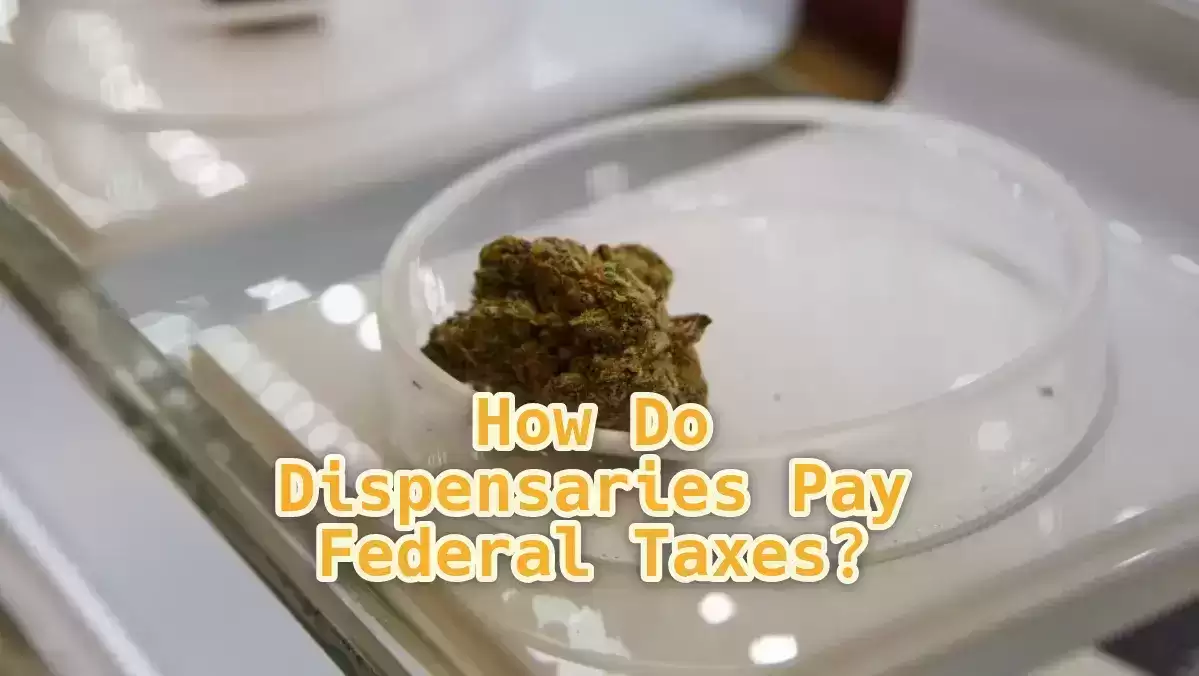
How Do Dispensaries Pay Federal Taxes?
In recent years, more and more states in the United States have passed laws making it legal to use cannabis for recreational and medical purposes, resulting in a burgeoning industry's growth. On the other hand, cannabis dispensaries face a complex and frequently baffling challenge: how can they pay their federal taxes.
This question revolves around a complex structure of regulations, with Section 280E looming as a significant factor. Enacted in the early 1980s, this tax provision has cast a long shadow over the cannabis industry, making it one of the country's businesses subjected to the highest levels of taxation and regulation.
To get the answer to this question, you will need to go on into the complex world of federal taxation for dispensaries and investigate the influence that Section 280E has on how they conduct business. This article sheds light on the intricacies of tax compliance for marijuana related businesses, offering insights, strategies, and a roadmap for dispensaries to navigate the ever-changing terrain.
Federal Taxation For Cannabis Dispensaries
The world of federal taxation for cannabis dispensaries is a labyrinthine journey, where every corner turned brings forth a new challenge. Cannabis dispensaries find themselves in a precarious position due to the wave of legalization sweeping across the United States. Even though they are legal businesses that operate following the rules of their respective states, they are still subject to a tax system that can be confusing and even punishing at the federal level.
The leading cause of the difficulties is the mismatch between the medical and recreational marijuana laws of the several states and those of the federal government. At the state level, cannabis is often recognized as a legal and regulated commodity, generating substantial tax revenue. Despite this, the United States government regards it as a Schedule I controlled substance, placing it in the same category as other illegal drugs such as heroin and LSD.
This classification places cannabis businesses in a unique predicament that triggers a chain of financial obligations and restrictions. It all starts with Section 280E of the Internal Revenue Code, which is a section that has far-reaching repercussions for the capacity of dispensaries to deduct regular business expenses. The tax situation is a labyrinth that begins with Section 280E. This disallowance of deductions can result in a tax burden significantly higher than most other industries face.
To navigate this treacherous terrain, cannabis dispensaries must meticulously track and report their income while grappling with the limitations set forth by Section 280E. Furthermore, the complexities of record-keeping and the uncertainty surrounding future federal regulations create an environment that necessitates financial acumen and legal expertise.
What Is Section 280E?
Since the beginning of the cannabis industry in the early 1980s, the regulation known as Section 280E of the Internal Revenue Code of the United States has been a persistent source of uncertainty and debate. This provision primarily pertains to the tax treatment of income generated from activities involving controlled substances, a category in which cannabis still resides at the federal level.
Section 280E is an innocuous provision of tax legislation that has significant repercussions due to its application. It states that businesses trafficking in controlled substances, as defined by the Federal Controlled Substances Act, are not allowed to deduct ordinary business expenses when figuring out their taxable revenue.
In the context of Section 280E, the word "trafficking" does not necessarily connote illicit or illegal activities. Even in states where cannabis use is allowed, it includes all aspects of the cannabis sector, from cultivation and production to distribution and sale.
The effect of this provision is twofold: first, it imposes a substantially harsher tax burden on cannabis dispensaries than it does on other types of businesses; second, it dramatically increases the taxable income of cannabis dispensaries.
The Impact Of Section 280E
The effects of Section 280E on dispensaries are far-reaching, touching on practically every aspect of their financial well-being. The provision is stringent in enforcing its stated goal (preventing drug traffickers from receiving tax deductions). Section 280E acts like an economic straitjacket, restricting dispensaries' operating ability and placing an unfairly heavy tax burden on them.
The consequences of Section 280E extend beyond the immediate financial impact. Dispensaries face hurdles in accessing traditional banking services, which are reluctant to serve an industry perceived as high risk due to the federal conflict with state laws.
Moreover, the lack of allowable deductions under Section 280E can hinder the ability of dispensaries to compete effectively, invest in growth, or even provide necessary patient services. This places immense pressure on these businesses, forcing them to operate with remarkable fiscal discipline.
A Trusted Industry Leader
With the ability to process payroll in 46 states and over 500 different jurisdictions, Würk has established itself as the industry's most comprehensive solution. Their role goes beyond mere management; it's about ensuring that businesses can focus on what matters most—making a positive impact in the world.
When cannabis businesses need help managing payroll, human resources, timekeeping, scheduling, and negotiating the complex web of tax requirements, this company is there to step in and lend a hand. The company's experience and trusted cooperation provide essential direction on 280E tax law, accounting, and banking in a sector for a constantly shifting compliance landscape.
Perhaps most impressively, their platform is designed to scale nationally, in sync with the growth of the cannabis industry, while respecting the unique laws and regulations of individual states.
Dispensaries And Federal Taxes
It's not easy to figure out how to pay federal taxes as a cannabis dispensary. The first step is gaining familiarity with the contradictory nature of state and federal cannabis legislation. At the state level, cannabis businesses are legal and regulated, generating substantial tax revenue. However, at the federal level, cannabis remains a Schedule I controlled substance, leading to a unique set of tax obligations.
Dispensaries, like any other business, are required to report their income and expenses to the Internal Revenue Service (IRS). However, the twist comes with the application of Section 280E, which disallows most traditional business deductions. This means that while a dispensary can't deduct expenses like rent, marketing, or employee salaries, they can only subtract their cost of goods sold (COGS) from their gross income if they are a vertically integrated business. This places them at a considerable disadvantage compared to businesses in other industries.

A thorough understanding of the tax system, careful record-keeping, and creative techniques to maximize deductions are essential for dispensaries to fulfill their federal tax responsibilities.
To reduce their taxable income, vertically integrated cannabis businesses can use strategies like cost allocation (between COGS and non-COGS expenses), business segmentation (using separate organizations for each business function), and inventory management optimization. It's a dynamic process requiring skills, including a solid understanding of the law and financial expertise.
Strategies For Maximizing Deductions
Due to the severe restrictions imposed by Section 280E, dispensaries must be creative to maximize deductions and stay in business. Although they are powerless to alter the law itself, they can modify their practices to lessen the effect of this provision.
- One key strategy involves carefully allocating expenses between COGS and non-COGS categories. By ensuring that certain expenses are directly tied to the production or purchase of cannabis products, they can be categorized as COGS and become deductible. This may involve meticulously tracking production and inventory costs and developing robust accounting systems.
- Dispensaries may also explore the possibility of forming separate business entities. One strategy for increasing the amount of expenses that can be deducted is to separate activities that are unrelated to the sale of cannabis (which is subject to Section 280E) from those that are. Though intricate and requiring legal knowledge, this tactic can effectively maximize deductions.
- Inventory management is another area where dispensaries can strategically navigate Section 280E. They can increase their tax benefits by practicing careful stock management and optimizing their product selling prices.
A thorough familiarity with the law, meticulous record-keeping, and a willingness to change and come up with solutions in the face of ever-changing restrictions are essential components of tax strategies for the cannabis industry.
Recent Changes And Trends
Federal taxation policies regarding cannabis dispensaries are dynamic and ever-evolving. There have been changes in both the regulations and the trends governing the federal tax obligations of dispensaries in recent years.
There has been an essential move toward legalizing cannabis on the state level. The number of states that have legalized cannabis for medical and recreational purposes is growing. Because of these changes, the cannabis industry has grown, and states have received more money in taxes as a result. However, they have not significantly changed cannabis' classification or taxation at the federal level.
In addition, the cannabis industry has become increasingly attractive as an investment option in recent years. The emergence of cannabis-related stocks and investment funds has signaled a growing recognition of the industry's potential profitability. This has also prompted a closer look at the federal tax implications of investing in cannabis-related businesses, further highlighting the need for efficient tax strategies.
The regulatory landscape isn't the only aspect that's changing. The cannabis sector is increasingly prioritizing ethical and environmentally friendly business practices. This development is a reaction to market demand and may also have tax repercussions. The tax liabilities of dispensaries may be further modified by the availability of tax credits and incentives for businesses that promote sustainability and responsible practices.
Empowering Cannabis Businesses With Workforce Management Solutions
It is of the utmost importance to have efficient workforce management in place, given the constantly shifting conditions that characterize the cannabis industry. Würk is one of the leaders in this industry: an organization whose aim is to empower and protect the individuals and organizations that make up the cannabis industry. They believe it is their responsibility to ensure this industry's growth while protecting its very core.
Beliefs That Drive Innovation
These values align seamlessly with their beliefs, which power their commitment to this burgeoning industry. They're not just workforce management; they're advocates for change:
- Empowering the Rebels of Cannabis: Their mission is to equip the industry's innovators with the tools they need to succeed.
- Making an Impact in the World: They see the cannabis industry as a catalyst for positive societal change.
- Leveling the Playing Field for Small Businesses: Small and large, every business deserves a fair shot in the competitive landscape.
- Continuous Improvement for Better Products: For them, progress is an ongoing journey, leading to superior and more valuable solutions.
- Resilient Solutions for Stability: In a complex and ever-changing field, resilience is the key to providing stability.
- Passion as the Driving Force: Passion fuels their tireless pursuit of achieving more in the cannabis space.
- Optimizing Transactions: They optimize the way businesses transact, creating more efficiency and growth.
Würk enables clients to effectively manage the industry's rapid growth by providing leading HCM tools and solutions to normalize the economy of cannabis.
The Bottom Line
With the exploration of how cannabis dispensaries pay taxes, one thing became clear: the path to financial responsibility in this industry is anything but straightforward. The intricate interplay of federal regulations, state laws, and the imposing presence of Section 280E creates an economic landscape that demands careful navigation.
Cannabis businesses must contend with a range of challenges that extend beyond just crunching the numbers. Compliance, adaptability, and innovation are essential elements in this journey. Dispensaries can employ several strategies to minimize their tax liability while maintaining legality, demonstrating the industry's determination to thrive despite the hurdles.
It's not merely about financial acumen; it's about resilience. The cannabis industry has grown to facilitate a healthier and happier community, pushing the envelope in areas like medical marijuana. The responsibility of businesses like the one mentioned is to ensure that this industry is safeguarded, allowing it to focus on making meaningful social change.
The future of cannabis taxation remains enigmatic, largely dependent on the evolution of federal policy and the interplay between a state and a federal law. As more states embrace cannabis legalization, the pressure on the federal government to address the disparities between state and federal regulations will intensify. There is a growing momentum for change, with increasing discussions about the need for reform in the taxation of marijuana businesses.
While Section 280E remains a significant hurdle, it's not inconceivable that future legislative changes may bring about revisions or alternatives that provide relief to the marijuana industry. This shift could level the playing field for dispensaries, creating an environment in which they can fully participate in the U.S. economy without the burden of excessive taxation.
Moreover, the cannabis sector's increasing recognition of sustainability and responsible business practices will likely shape its future. This trend could lead to tax incentives for environmentally friendly practices, further influencing the industry's financial landscape.
Disclaimer: This material is for informational purposes only and should not be relied on for legal, medical, financial, or other professional advice.




















